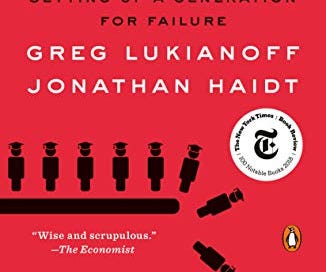A generation at risk
Can we prevent iGen from throwing away our nation's social, cultural, and intellectual progress?
By Jonathan Haidt and Greg Lukianoff
Grade: 96/100
This book has been on my must-read list for a few years now, after I’ve seen it referenced over and over by some of my favorite writers. The work dives deep into the growing trend of over-protection and intolerance on college campuses, and highlights how much of the intolerance seen on college campuses arises out of how iGen was raised—with a lack of emphasis on free play, which is when kids learn cooperation, disagreement, debate, etc.; with an eye on emotional safety over intellectual challenges; and having daily hours of screen time, specifically social media. (iGen refers to kids born between 1995 and 2012.)
What it all means: The book makes a compelling case for how well-meaning efforts to protect students from harm instead resulted in a culture of fragility and intolerance.
Background: In 2015, after a spate of noisy college demonstrations over free speech, the authors penned an article in The Atlantic, and in it identified what they called the “The three Great Untruths”:
“What doesn’t kill you makes you weaker,”
“Always trust your feelings,” and
“Life is a battle between good people and evil people.”
These ideas, effectively argued with supporting evidence from a plethora of anecdotal and empirical research, became the basis for the book, which shares voluminous examples of how much of the foolishness we see taking over college campuses can be traced to one or more of these sources.
My reaction: The parts of the book that most sickened me are where the authors discussed how, at universities across the country, the administrators are complicit in this nonsense, often kowtowing to the mobs of teenagers who, in the name of safety, use the heckler’s veto to prevent speakers sharing different views from speaking on campus.
Worse still, these students often resort to violence against the speakers and those who support them. And instead of being challenged by authority during the episodes or punished thereafter, the students using such thuggery are often not only placated, but supported by faculty and staff.
Again, we’ve been hearing for more than a decade that this is happening, The Coddling of the American Mind provides context for why it’s happening and what should be done to prevent it.
Why it matters: I found myself nodding along throughout the reading of the book, with example after example being a startling fact supported by data that I wasn’t aware of but that seems entirely plausible even for the novice. One concept they shared surrounds the notion of concept creep, which, though popularized by psychologist Nick Haslam, describes how terms such as unsafe, trauma, and violence are being used in place of the more apt labels of discomfort, insecure, fear. This allows people—especially students on college campuses and protestors nationwide—to justify the use of violence for their own ends.
“Most students oppose the use of violence. When asked in a poll conducted by FIRE whether they themselves would use violence to stop someone from speaking, only 1% said yes. But there is a much larger group—roughly 20% to 30%, according to the two surveys we described earlier—that is willing to support other students who use violence . . . The most common justification is that hate speech is violence [so] some students believe it is therefore legitimate to use violence to shut down hate speech. Setting aside the questions of moral and constitutional legitimacy, what are the psychological consequences of thinking this way?”
This isn’t just sad; it’s downright scary.
What should give us all chills: As I’ve said to several friends since reading the book, “What concerns me most is the kids we see behaving violently on college campuses are supposed to represent the best of us, our future.” Instead, what the authors see is cause for concern, as a generation raised with myriad hours of screen time but little free play, grows more and more “politically and socially stunted,” leaving them disabused of notions of fairness, disinclined to engage with dissimilar ideas or individuals. They argue that this opens a generation of young adults up to dangerous ideas, including authoritarianism, on all sides.
The verdict: If you care about the future of the country, you owe it to yourself to read this book. It’s that good; the topic is that important.




